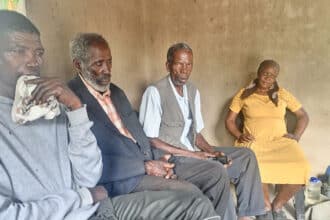AWARD WINNING MOTSWANA FILM MAKER DISCUSSES HER NEW RELEASE
A woman who wears many hats, Boston, USA-based Thato Rantao Mwosa has enjoyed an illustrious career as a multidisciplinary artist abroad.
Voice Woman spoke to the award-winning writer-director, illustrator, playwright, educator, and game inventor about her 2021 release, ‘Memoirs of a Black Girl’, which is currently showing in America as part of the Black History Month film festival.
The film’s about an ambitious and bookish student whose determination to earn a scholarship is imperiled by an unfortunate event.
Before we can talk about your latest film ‘Memoirs of a Black Girl’, briefly share with our readers about your various roles.
TRM: I’m an illustrator and through my art company, Tuli Art, I focus on Black ballerinas and African women’s art.
I also do animal artwork, which is mostly used for children’s room decor. In the summer of 2020, I launched a game called SAWA Trivia with my husband.
SAWA African Trivia Card Game is an edu-taining card game that celebrates the diversity, the rich history and the beauty of African culture.
It is currently being distributed in America but we are planning to distribute worldwide.
Finally, I’m a filmmaker by training. I also teach film at a high school in Boston.
When did you decide to become a filmmaker and who/what inspired you?
TRM: I decided early on because I come from a family of storytellers.
My father, as you know, was a journalist- turned-politician. He loved to write and he inspired me.
My uncle, Michael Rantao, wrote a play, Ditiragalo, which was read in schools by students across the country.
My aunt, Theresa Ogle, wrote a children’s book.
Storytelling is in my genes and I’m just carrying on the tradition but using a different medium.
Your latest film ‘Memoirs of a Black Girl’ is screening this month in the US as part of Black History Month Film Festival, what is the intended message that you wish to communicate?
TRM: This film is a love letter to my students.
I wanted to write something to inspire them so that they know that despite the pressures and the challenges they encounter, they can overcome and attain their goals.
I wanted to honour the resilience of young people and capture their lived experiences.
The film is about an ambitious and bookish student whose determination to earn a scholarship is imperiled by an unfortunate event, was the narrative shaped by your personal experiences?
TRM: The lead character Aisha is a composite of the many brilliant young black girls I have encountered in my teaching life.
A lot of the themes I tackle in the film are things we have to deal with as educators in high schools i.e. drugs, cyber bullying, identity etc.
As an educator, do you ensure your films remain both educational and entertaining?
TRM: Of course, I embedded subtle messages in the film and wrapped them as entertainment.
Young people don’t like to be lectured to all day long. This is one way to reach them.
How long did it take to film ‘Memoirs of a Black Girl’?
TRM: I wrote the film 7 years ago. I shot it in 2019 and I wrapped post-production late 2020.
Share with us the filming process. What was the biggest challenge you faced while making your film?
TRM: Funding is often challenging. The scarcity of film grants makes it hard for filmmakers to realize their visions.
What new film/projects are you working on; anything on Botswana?
TRM: I’m working on a film called A Blue Dawn, which will be entirely shot in Botswana.
Hopefully, we can start pre-production end of 2021 and start production 2022.
I’m working with Shike Olsen to make this project happen. He knows the landscape and he is also a film creative.
We are at an early development stage, refining the script and applying for film grants.
And lastly, what advice would you like to give to up and coming filmmakers back here at home?
TRM: Study other filmmakers, read film craft books, and watch lots of movies (good or bad) to see how filmmakers succeed or fail.
Write and direct the movie you do not see on the screens. Don’t let the lack of money stop you.
If you have a cellphone with video recording capability, and friends who can act, make your film.
Never stop believing in yourself and your dream.





